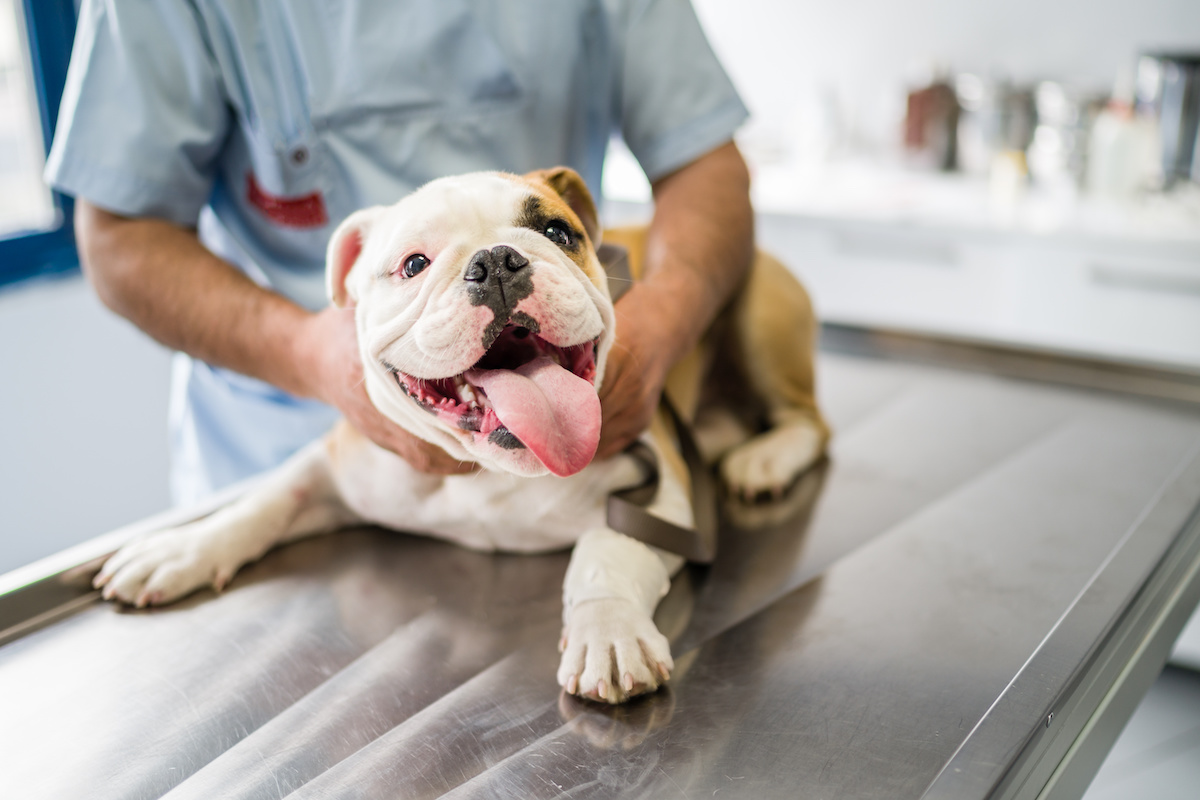As we celebrate Valentine’s Day this month with a holiday that is all about love, it’s a great time to talk about pet heart disease. Aside from maybe our mothers and fathers, pets show us unconditional love when we need it the most.
Just like people, pets also need special attention and care when it comes to heart health. In this blog, we’ll show you how to tend to the heart health of your cat or dog so you can spend many years loving them as much as they love you.
What is Heart Disease in Pets?
First, let’s talk about the basics of heart disease. What is it, and what does it mean for your cat or dog?
Heart disease means that your pet has a disease of the heart muscle. In humans, there is a type of heart disease called “coronary heart disease,” or “endocardiosis,” where the coronary arteries supplying blood to the heart are blocked. In cats and dogs, the heart muscle itself is affected by heart disease.
All pets have a four-chambered heart with one atrium (upper chamber) and one ventricle (lower chamber). Blood enters the heart through the right atrium and is pumped to the lungs through the right ventricle, then to the left atrium and into the left ventricle before the blood is pumped out to the body. Blood pressure is the force that the blood develops as it is pumped through the body.
With your cat or dog, heart disease is a condition that causes the heart to have trouble operating properly. In dogs, the most common cause is a heart murmur. In cats, heart disease also starts with a heart murmur. However, it progresses to heart failure, where much of the heart muscle is not getting enough blood and oxygen.
Cardiovascular disease, or “heart disease” as it is commonly called, is a condition where there is interference in the blood flow. This can result from the flow being blocked, or from blood vessels that are too narrow. Heart disease can lead to heart failure, which is when the heart muscle becomes too weak to pump blood effectively.
We understand that this sounds a little scary for pet owners, especially if you have concerns about heart disease. Let’s talk about the symptoms your pet might experience if heart disease is present.
Symptoms of Heart Disease in Pets
The symptoms of heart disease in pets can be subtle and confusing, especially in dogs. One reason is that all four chambers in the heart need to be affected for any of the following symptoms to develop.
Cardiovascular disease can occur in any breed, at any age and in either sex. Signs of heart disease can include:
- excessive panting
- excessive fatigue
- exercise intolerance
- trouble breathing or swallowing
- excessive drooling
- coughing, gagging or vomiting
- dizziness
- depression
- collapse
- bruising due to ruptured blood vessels
- weak pulse
Dogs and cats with heart disease may become weak, lethargic and depressed, less interactive, or they may display signs of pain. Some animals show no signs at all during the early stages of heart disease, which can make it difficult to detect.
Heart disease can be harder to detect in pets than in people. One reason is that pet owners often don’t notice subtle symptoms; another is that veterinarians don’t routinely rely on the same diagnostic tests as cardiologists.
Cardiac exams aren’t always as routine for pets as they are for people. This is a large reason why heart disease may get overlooked in cats or dogs.
What About Heartworm?
Heartworm is not the same thing as heart disease. However, the two have some similar characteristics. But what is heartworm, and what do you need to know about it?
The name “Heartworm” comes from the fact that this parasite infects the heart and lungs of dogs. The dog becomes infected by being bitten by an infected mosquito. The disease is spread through the blood, just like heart disease.
Heartworm disease is one of the most important health challenges facing dogs today.
The heartworm lives in the arteries of the heart and causes irreversible damage over time. A dog can carry the heartworm and never show any symptoms, but in a year or two, it can be too late to treat.
It is a serious matter, so if you live in an area where heartworm is prevalent, you need to take precautions. Unfortunately, heartworm is also very expensive to treat, but it can be done if you catch it in time.

What are the Signs of Heartworm in Dogs?
Signs of heartworm disease may not be noticeable until the disease progresses to later stages.
The most common symptom of heartworm is coughing, which can be persistent, severe and quite frightening. The coughing can be easily confused with the symptoms of other respiratory infections, so it is important to test your dog before you treat him or her for heartworm.
Heartworm symptoms include:
Difficulty breathing
Lethargy
Diarrhea
Weight loss
Extreme fatigue
Dogs with heartworm may appear to have heart disease, and it’s easy to mistake heartworm for this condition. A careful examination from your veterinarian is critical if you suspect that your dog may have heartworm. Keeping your dog on routine medication to prevent heartworm is the best course of action.
Treating Heart Disease in Pets
When you find out that your dog or cat has heart disease, you might wonder what comes next. How do you treat heart disease in pets?
When a pet has heart disease, treatment is focused on relieving symptoms and managing the condition. When you learn your dog or cat’s heart is failing, you want to know if it is reversible or not. You also want to know the chance of survival, the prognosis for recovery, and if your pet is in pain. Finding out the answers to these questions can help you get a clear picture of what the future holds for your pet.
The first step is to make sure your pet has a thorough medical exam. Your veterinarian will want to know if there have been any other pets in your family that had heart problems. He or she will ask about any medications or supplements your pet may be taking, as some may affect the heart.
A physical examination and X-rays are next. These will determine the size and shape of your pet’s heart, as well as look for any abnormalities.
In the past, the prognosis for pets with heart disease was not good. Many pets were simply put to sleep. Today, veterinarians have more options available to treat pets with heart disease. The type of treatment will depend on the severity of the heart disease, as well as how long it has been present. Most pets with heart disease will require treatment for the rest of their life.
If you find that your pet has heart disease, your veterinarian will discuss the most effective treatment opportunities. The goal is to keep your pet as happy and comfortable as possible with this condition.
What are the Risks of Heart Disease in Pets?
When most of us think about heart disease in humans, we think of high cholesterol, high blood pressure, coronary artery disease and heart attacks. But heart disease can affect dogs and cats as well. Although many of the risk factors are the same for dogs and cats, such as age and gender, the types of heart disease and treatments may differ. As more people become aware about pet health, earlier detection of heart disease is now possible.
Hereditary Risk Factors
Heart disease in pets can be hereditary, just as it is in humans. If a pet’s parent has a heart condition, the risk of developing a heart condition is higher for their offspring. Unfortunately, this means your dog or cat has a chance of getting heart disease even though you feed a good quality diet and provide regular exercise.
Poor Diet
Does a poor diet make it more likely that your dog or can will develop heart disease? The answer is a resounding yes.
When dogs are fed a diet high in fat, their cholesterol levels increase. A high fat diet is also linked with atherosclerosis in dogs.
According to a study out of the University of California Davis, researchers collected data on the diets of dogs and cats that were undergoing treatment for heart disease. The diets were compared to the diets of dogs and cats that did not have heart disease.
The study finds that in both dogs and cats, high protein diets were associated with an increased risk of heart disease. This was true even when the animal was consuming a “prescription diet” with fish oil.
Obesity
Lastly, obesity poses a risk for heart disease in both cats and dogs. Obesity can potentially result in serious health problems, particularly liver disease and heart disease.
One of the most serious complications of obesity is cardiac disease. An obese dog or cat can suffer from high blood pressure, which can result in congestive heart failure and even death.
As an obese dog or cat ages, his or her joints may suffer as a result of the excess weight. This will cause mobility problems caused by pain, including difficulty getting up and going to the litter box.
Keeping your pet’s weight in check is one of the best ways to prevent heart disease as well as other heart ailments.
Schedule an Appointment with Main St Vet
If you have concerns about heart disease and your pet, please contact us here at Main St Vet. We’ll give your dog an evaluation to help determine heart health along with any insight necessary for additional testing. We’re happy to help!








